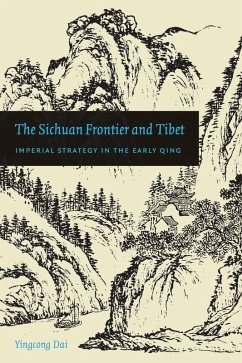During China's last dynasty, the Qing (1644-1911), the empire's remote, bleak, and politically insignificant Southwest rose to become a strategically vital area. This study of the imperial government's handling of the southwestern frontier illuminates issues of considerable importance in Chinese history and foreign relations: Sichuan's rise as a key strategic area in relation to the complicated struggle between the Zunghar Mongols and China over Tibet, Sichuan's neighbor to the west, and consequent developments in governance and taxation of the area.
Through analysis of government documents, gazetteers, and private accounts, Yingcong Dai explores the intersections of political and social history, arguing that imperial strategy toward the southwestern frontier was pivotal in changing Sichuan's socioeconomic landscape. Government policies resulted in light taxation, immigration into Sichuan, and a military market for local products, thus altering Sichuan but ironically contributing toward the eventual demise of the Qing.
Dai's detailed, objective analysis of China's historical relationship with Tibet will be useful for readers seeking to understand debates concerning Tibet's sovereignty, Tibetan theocratic government, and the political dimension of the system of incarnate Tibetan lamas (of which the Dalai Lama is one).
Through analysis of government documents, gazetteers, and private accounts, Yingcong Dai explores the intersections of political and social history, arguing that imperial strategy toward the southwestern frontier was pivotal in changing Sichuan's socioeconomic landscape. Government policies resulted in light taxation, immigration into Sichuan, and a military market for local products, thus altering Sichuan but ironically contributing toward the eventual demise of the Qing.
Dai's detailed, objective analysis of China's historical relationship with Tibet will be useful for readers seeking to understand debates concerning Tibet's sovereignty, Tibetan theocratic government, and the political dimension of the system of incarnate Tibetan lamas (of which the Dalai Lama is one).
Dieser Download kann aus rechtlichen Gründen nur mit Rechnungsadresse in A, D ausgeliefert werden.

